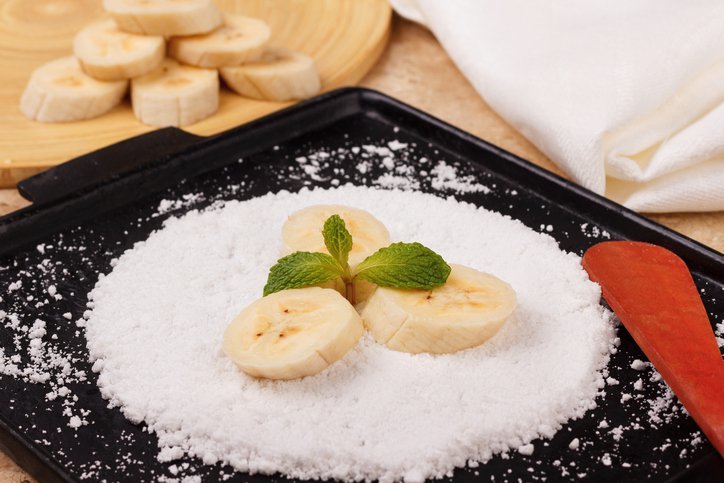Contents:
- Medical Video: Homemade Whole Wheat Flour | 100% Healthy & Natural
- What is tapioca flour?
- What are the benefits of tapioca flour for health?
- People with gluten free diets
- Helps facilitate digestion
- Good for people with hypertension, heart disease and stroke
- Have a neutral feeling
- Who can't eat too much tapioca flour?
- Diabetics
- Allergic person
Medical Video: Homemade Whole Wheat Flour | 100% Healthy & Natural
There are many types of flour from various ingredients that can be used by us to make a dish. One type of flour that can be used for cooking is tapioca flour. This flour can be created to make various dishes, including cakes, bread and soup. In addition to cooking, there are many other benefits of tapioca flour for health, but there are also disadvantages.
What is tapioca flour?
Tapioca flour is flour made from cassava, so sometimes people know it better as cassava flour or starch. This flour contains lots of carbohydrates and a little protein, fiber, or other nutrients.
Tapioca flour can be an alternative for those of you who run a gluten free diet. This flour can be a substitute for flour or wheat for those of you who can't eat foods that contain gluten. Using tapioca flour, you can make gluten-free bread, pudding or other desserts, as a thickener for soups and sauces, as a binding agent in making burgers, nuggets and other doughs. This binding agent works by increasing the texture and moisture content, so that the trapped moisture forms like a gel.
What are the benefits of tapioca flour for health?
This tapioca flour can be used for:
People with gluten free diets
Some people may experience gluten intolerance, as in people with celiac disease. This makes them unable to tolerate even a small amount of food containing gluten. Because tapioca flour is made from cassava which is naturally gluten free, tapioca flour is very suitable for people with a gluten free diet.
This tapioca flour can be a substitute for flour for people with gluten intolerance. In people with a gluten free diet, tapioca flour can be used to make bread and cakes, or it can also be as thickener in soups or sauces.
However, when you buy tapioca flour, you should choose a product labeled gluten free. Not all tapioca flour sold on the market must be free of gluten. This can happen because usually flour is processed with the same equipment, which makes it risky to experience cross contamination with other flour products that have gluten content.
Helps facilitate digestion
Tapioca flour contains resistant starch. Resistant starch is starch that cannot be digested by the body, so this starch can help facilitate digestion, its function is the same as that of fiber in the digestive system.
This is why tapioca flour can be used to prevent constipation or constipation. In addition, resistant starch found in tapioca flour also supports the growth of good bacteria in the intestine, so it can reduce inflammation and reduce the number of bad bacteria in the intestine.
Just like fiber, resistant starch can also reduce blood sugar levels after eating, increase glucose and insulin metabolism in the body, and can make you full longer. All of these things are very useful to improve the health of metabolism in your body.
However, because tapioca flour has a very low nutrient content, you also need to get the benefits of resistant starch from other sources, such as potatoes, rice, or beans (if you don't have to eat gluten-free foods).
Good for people with hypertension, heart disease and stroke
Naturally, tapioca flour contains low sodium. This is beneficial for people who have high blood pressure, suffer from heart disease, or stroke. Your daily limit for sodium is 2300 mg for adults. To get the benefits of tapioca flour, you should not add too much salt or baking soda on your cuisine.
Have a neutral feeling
Yes, tapioca flour has a neutral, tasteless taste. This benefits you when cooking because the use of tapioca flour will not affect the taste of your food, unlike other flour. Because it has a bland taste, you can use tapioca flour to cook all kinds of dishes, both sweet and salty.
Who can't eat too much tapioca flour?
Apart from the advantages as above, tapioca flour also has several disadvantages, so it should be reduced if you:
Diabetics
The carbohydrate content is very high in tapioca flour, and the poor content of other nutrients, making diabetics have to limit the consumption of this flour. Indeed, the starch content is resistant in tapioca flour can reduce blood sugar levels as described above. However, consumption in large quantities is also not good for diabetics, it is feared this could increase your blood sugar levels.
Allergic person
Relax, this does not apply to everyone. Allergic reactions can occur in people who are allergic to latex due to cross reactivity. This is known as latex-fruit syndrome. This event rarely happens.
READ ALSO
- 7 Alternative Materials for Making Delicious Cuisine Without MSG
- Is Gluten Free Diet Really Healthier?
- 10 Gluten Free Lunch Recipe Ideas












